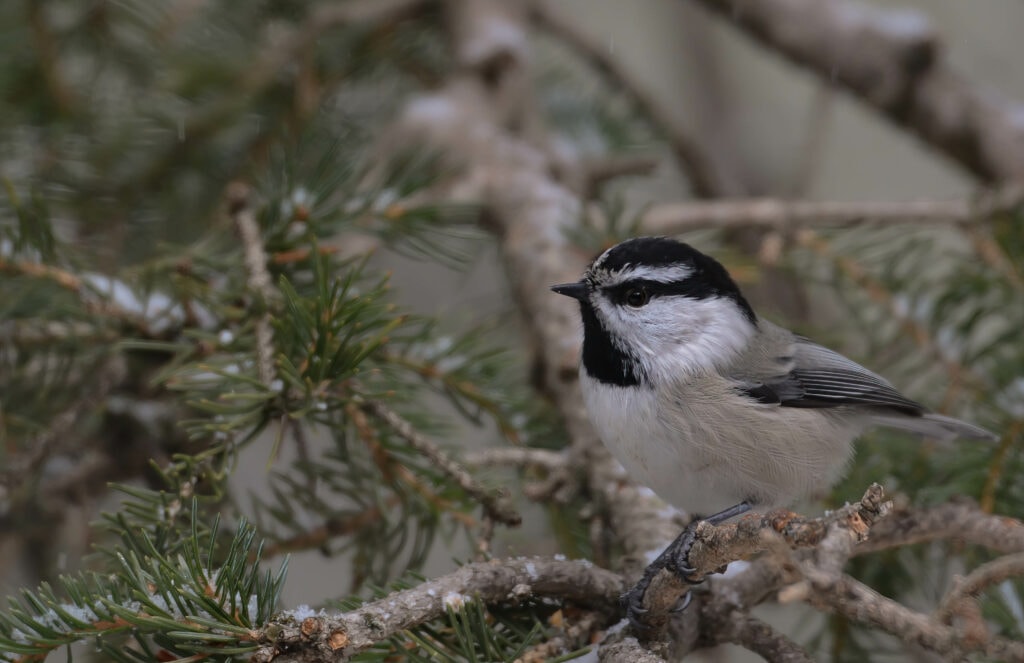The Black-capped Chickadee and Carolina Chickadee are some of the most iconic and beloved of North America’s backyard birds. But for birdwatchers who live to the west of the Rocky Mountains, two alternative chickadees fill the role of beloved little songbird and backyard visitor. These are the Chestnut-backed Chickadee and the Mountain Chickadee. The Chestnut-backed Chickadee is found along a narrow strip of territory following the Pacific coast from California up through Alaska. But for a wider swathe of the western United States, the Mountain Chickadee reins supreme. This small and charming cousin of the more well-known members of the chickadee family is usually found in mountainous regions, as its name suggests.
Mountain Chickadees, like other chickadees, belong to the tit family. They are small, round-bodied birds with black and white plumage on their heads. Chickadees are named for the calls they make and the Mountain Chickadee is no exception. Mountainous forests throughout their range echo with the chick-a-dee-dee-dee call that is the chickadee’s trademark.
Related Article: Extremely Rare “Half Male” and “Half Female” Bird Found in Colombia
Fun Facts About the Mountain Chickadee
The Mountain Chickadee might not be as iconic as its eastern cousins, but it has every bit as much personality. Let’s dive into some Mountain Chickadee fun facts to learn more about what makes this pint-sized songbird so lovable!
Chickadee-dee-dee: The cheerful buzzy song that the gives the Mountain Chickadee its name is more than just a fun little tune. It’s actually chock-full of information! Firstly, chickadees actually have a number of different calls and songs that they use to communicate with each other. Some sounds are used to establish their territory, while others may represent a warning that danger is near. The “chickadee-dee-dee” call is often used as an alarm call that signals a potential predator nearby. What’s even more amazing is that the number of “dees” in the call can tell other birds how severe the danger is. More “dees” at the end of the “chickadee” is generally thought to signify a more imminently dangerous predator!
Counting calories: Mountain Chickadees are tiny little things. Their personalities are large, but like other members of the tit family, their entire bodies are just a few inches long. Because of this, it doesn’t take a whole lot of food to keep a Mountain Chickadee moving. They only need about 10 calories per day to get by. For reference, 10 calories is about half of a cashew.
Disney princess time: Ever dream of having a wild bird land in your hand? Well it isn’t the most sanitary practice, so be sure to wash your hands well and be safe about the whole thing, but if your goal is to hand-feed a wild bird the Mountain Chickadee is a pretty good candidate. These birds are outgoing and will often land on humans to eat sunflower seeds or other snacks out of an outstretched palm. You can attract Mountain Chickadees to you by imitating their calls or playing them on your phone, but be careful. There are ethical concerns associated with using bird calls to attract birds as this may disturb or agitate them. Make sure what you’re doing is safe and legal in your area and be sure to read plenty of guides to make your birding experience safe for the birds!
The Future of the Mountain Chickadee
Mountain Chickadees are common birds that are nowhere near endangered yet. The International Union For the Conservation of Nature’s Red List of Threatened Species lists the Mountain Chickadee as “Least Concern” and “stable.” Despite this, avian conservation groups are beginning to raise concerns. Though common, the Mountain Chickadee has declined by 39% since 1966 and they are sometimes referred to as a common bird in steep decline. As bird populations on the whole drop across the globe, even our most common and ubiquitous feathered friends have taken a hit. The future of the Mountain Chickadee is the future of our planet’s entire avian population; uncertain.
Popular Article: Study Indicates That Better Singers May Be Better Thinkers Too

